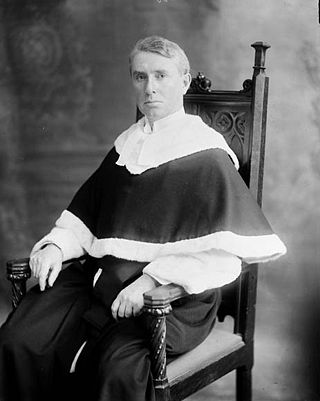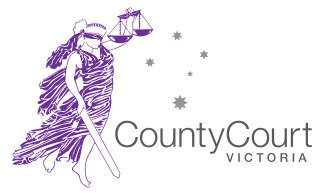The Courts of England and Wales, supported administratively by His Majesty's Courts and Tribunals Service, are the civil and criminal courts responsible for the administration of justice in England and Wales.

The term magistrate is used in a variety of systems of governments and laws to refer to a civilian officer who administers the law. In ancient Rome, a magistratus was one of the highest ranking government officers, and possessed both judicial and executive powers. In other parts of the world, such as China, magistrate is a word applied to a person responsible for administration over a particular geographic area. Today, in some jurisdictions, a magistrate is a judicial officer who hears cases in a lower court, and typically deals with more minor or preliminary matters. In other jurisdictions, magistrates are typically trained volunteers appointed to deal with criminal and civil matters in their local areas.
Small-claims courts have limited jurisdiction to hear civil cases between private litigants. Courts authorized to try small claims may also have other judicial functions, and go by different names in different jurisdictions. For example, it may be known as a county or magistrate's court. These courts can be found in Australia, Brazil, Canada, England and Wales, Hong Kong, Ireland, Israel, Greece, New Zealand, Philippines, Scotland, Singapore, South Africa, Nigeria and the United States.

Judiciary of Malaysia is largely centralised despite Malaysia's federal constitution, heavily influenced by the English common law, as well as Islamic jurisprudence.

The Judiciary of the Hong Kong Special Administrative Region is the judicial branch of the Hong Kong Special Administrative Region. Under the Basic Law of Hong Kong, it exercises the judicial power of the Region and is independent of the executive and legislative branches of the Government. The courts in Hong Kong hear and adjudicate all prosecutions and civil disputes, including all public and private law matters.

France's independent court system enjoys special statutory protection from the executive branch. Procedures for the appointment, promotion, and removal of judges vary depending on whether it is for the ordinary or the administrative stream. Judicial appointments in the judicial stream must be approved by a special panel, the High Council of the Judiciary. Once appointed, career judges serve for life and cannot be removed without specific disciplinary proceedings conducted before the council with due process.

The courts of Scotland are responsible for administration of justice in Scotland, under statutory, common law and equitable provisions within Scots law. The courts are presided over by the judiciary of Scotland, who are the various judicial office holders responsible for issuing judgments, ensuring fair trials, and deciding on sentencing. The Court of Session is the supreme civil court of Scotland, subject to appeals to the Supreme Court of the United Kingdom, and the High Court of Justiciary is the supreme criminal court, which is only subject to the authority of the Supreme Court of the United Kingdom on devolution issues and human rights compatibility issues.

The County Court of Victoria is the intermediate court in the Australian state of Victoria. It is equivalent to district courts in the other states.

The judiciary of Pakistan is the national system of courts that maintains the law and order in the Islamic Republic of Pakistan. Pakistan uses a common law system, which was introduced during the colonial era, influenced by local medieval judicial systems based on religious and cultural practices. The Constitution of Pakistan lays down the fundamentals and working of the Pakistani judiciary.

Specialized court is a type of court with limited subject-matter jurisdiction concerning particular field of law, compared to 'ordinary court' with general subject-matter jurisdiction. This concept of court usually includes administrative court or family court.

Israeli law is based mostly on a common law legal system, though it also reflects the diverse history of the territory of the State of Israel throughout the last hundred years, as well as the legal systems of its major religious communities. The Israeli legal system is based on common law, which also incorporates facets of civil law. The Israeli Declaration of Independence asserted that a formal constitution would be written, though it has been continuously postponed since 1950. Instead, the Basic Laws of Israel function as the country's constitutional laws. Statutes enacted by the Knesset, particularly the Basic Laws, provide a framework which is enriched by political precedent and jurisprudence. Foreign and historical influences on modern-day Israeli law are varied and include the Mecelle and German civil law, religious law, and British common law. The Israeli courts have been influenced in recent years by American Law and Canadian Law and to a lesser extent by Continental Law.

The Magistrates Court of the Australian Capital Territory is a court of summary jurisdiction that deals with the majority of criminal law matters and the majority of small civil law matters in the Australian Capital Territory, the Jervis Bay Territory and the Australian Antarctic Territory.
The Children's Court of Victoria is a statutory court created in Victoria, Australia. The court deals with criminal offences alleged to be committed by children aged between 10 and 17 and with proceedings concerning children under the age of 17 relating to the care and protection of children.

The judiciary of Italy is composed of courts responsible for interpreting and applying the law in the Italian Republic. Magistracy is a public office, accessible only to Italian citizens who hold an Italian Juris Doctor and have successfully partaken in one of the relevant competitive public examinations organised by the Ministry of justice. The judicial power is independent and there is no internal hierarchy within. Italian magistrates are either judges or public prosecutors.

The Massachusetts District Court is a trial court in Massachusetts that hears a wide range of criminal, civil, housing, juvenile, mental health, and other types of cases.

The basis of the Bahamian Law and legal system lies within the English Common Law tradition. Justices of the Supreme Court, Registrars and Magistrates are all appointed by The Governor-General acting on the advice of the Judicial and Legal Service Commission, which is composed of five individuals who are headed by the Chief Justice as their chairman. The Chief Justice and the Justices of the Court of Appeal, including the President, are appointed by the Governor-General on the recommendation of the Prime Minister after consultation with the Leader of the Opposition. Once appointed, the salaries and other terms of appointment of the Chief Justice, Justices of Appeal and Justices of the Supreme Court cannot be altered to their disadvantage. Justices of the Supreme Court can serve until the age of 65 years and, where agreed among the judge, the Prime Minister and the Leader of the Opposition, may serve until the age of 67. Justices of Appeal can serve until the age of 68 years and, where agreed among the judge, the Prime Minister and the Leader of the Opposition, may serve until the age of 70 years. The law of The Bahamas makes provisions for the appointment of 12 Justices to the Bench of the Supreme Court, inclusive of the Chief Justice, and for five Justices of the Court of Appeal, inclusive of the President. The Chief Justice, as Head of the Judiciary, is an ex officio member of the Court of Appeal, but only sits at the invitation of the President.

The Judiciary of Kenya is the system of courts that interprets and applies the law in Kenya. After the promulgation of the Constitution of Kenya in 2010, the general public, through parliament, sought to reform the judiciary. Parliament passed the Magistrates and Judges Vetting Act of 2011. A major part of reforming the judiciary was the vetting of Magistrates and Judges in an attempt to weed out unsuitable ones. The Judicature Act has also been amended to raise the minimum number of Magistrates and Judges allowing more judicial officers to be hired. More magistrates and judges are needed to clear the backlog of cases that have caused great delay in the conclusion of cases and to staff new courts. New courts are needed to bring the courts closer to the people which is in line with devolution, a major principle written into the Constitution of 2010. New courts like the High Court opened in Garissa in November 2014 is a good example. In the past residents of North Eastern Kenya had to go all the way to Embu to access a High Court.

The Judiciary of Malawi is the branch of the Government of Malawi which interprets and applies the laws of Malawi to ensure equal justice under law and to provide a mechanism for dispute resolution. The legal system of Malawi is based on English law, modified since 1969. The Constitution defines the judiciary as a hierarchical system of courts, with the highest court being a Supreme Court of Appeal, together with a High Court and a number of magistrates' courts. Malawian judiciary has frequently demonstrated its independence in recent years. The constitutional court of Malawi nullified the 2019 election results, citing widespread irregularities. The Supreme court upheld the verdict of the constitutional court. Five Constitutional Court judges who overturned the results of the 2019 election have been nominated by the UK thinktank Chatham House for the 2020 Chatham House Prize. Ultimately the judges went onto win the prize.

The Judiciary of Tanzania is the system of courts that interprets and applies the law in Tanzania. The current judiciary bases its foundation to the constitution of the United Republic of Tanzania of 1977. Under the Constitution of Tanzania, Justices and Magistrates are independent of the government and subject only to the Constitution and the law. The country has a dual juristition system where there is a judicial structure responsible for Tanzania Mainland and another for Zanzibar. The Court of Appeal of the United Republic was established in 1979 as the final appellate judicial body with jurisdiction over the entire union.

The Subordinate Courts of Kenya are courts subordinate to Kenya's High Court, established under Article 169 of the Constitution of Kenya 2010.
















